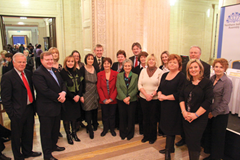Mervyn Storey: top priorities on Education Committee
 Education Committee Chair Mervyn Storey outlines the challenges facing the sector as dissolution nears, and discusses his personal views and the committee’s work with Emma Blee.
Education Committee Chair Mervyn Storey outlines the challenges facing the sector as dissolution nears, and discusses his personal views and the committee’s work with Emma Blee.
“There has been a massive breakdown in trust and that has allowed organisations to retract into very defined, well held positions,” Mervyn Storey remarks.
With the education system in disarray and a dissipating relationship between the department and education’s key stakeholders, he says it is difficult to find a way forward to deal with many of the challenges.
Taking up the chair of the Education Committee in June 2008, Storey says his interest in the sector came from having a young family.
At present, the main concern for the committee is impending budget cuts. At the time of interview, the education committee had still not been shown a breakdown of the draft education budget.
It will be a challenge to make substantial savings within education, he claims, as around 85 per cent of the current budget is “tied up in salary costs”. But whatever the budget dictates, Storey says protecting education’s frontline services, such as classrooms, is a priority.
The cost of transport is one of the main budgetary problems facing the department. The committee is also concerned about the amount of money being put into extending free school meals: “We need to be absolutely clear that is going to give us good outcomes,” comments Storey.
While he argues that the rationalisation of governance arrangements could raise some additional finance, he believes the main problem within the department is that there are too many different types of schools.
“We cannot continue to have a duplication of a number of schools that we have in Northern Ireland and the cost that incurs and still believe we can find savings somewhere else in the system. That is the biggest challenge, I think, in terms of being able to deal with the overall budget for the education system.”
ESA
From a personal perspective, Storey claims that there are “fundamental flaws” with Caitríona Ruane’s proposals for an Education and Skills Authority. He states that the legal position of Protestant church transferors is not protected in the proposals.
Another problem, he contends, is that Ruane “wanted to have a board that was made up of ‘yes men’,” appointed by her. He comments that whoever sits on the board should be “reflective of the communities that make up the educational system”.
While Storey believes that rationalisation is necessary, he argues that it should be based on current legislation, which protects the rights of transferors, allows councillors to sit on the board and states that only 20 per cent of board members can be appointed.
The way forward, he says, is “to create a single education board for Northern Ireland” but this should only be done when a local sub-structure is put in place and the community is represented equally.
However, he isn’t hopeful this will happen before dissolution in March: “I think it will be left to a new Assembly when there is a new Education Minister in place who will hopefully be more amenable to debate and dialogue, and not driven by a very defined, ideological position.”
However, coming up with an alternative to the current schools structure is an ongoing debate. The committee has looked at the single schools system but Storey says there needs to be a lot more work done to ensure that system restores confidence and achieves positive outcomes.
The ultimate challenge, he believes, will be creating a system that can educate a large number of children in an effective and efficient way.
With such a wide range of educational sectors in place throughout the province, Storey says that to make progress it is crucial that the Education Minister gains the consensus and agreement of those sectors.
Academic selection is another issue which was high on the education committee’s agenda in 2010. Storey says he, and the education committee, share “the frustration of the public at large” on the matter.
In 2008, the Education Committee sought the view of all organisations in education and considered the Minister’s proposals for transfer, and other alternatives. While the committee “struggled to reach consensus”, it highlighted two main points to Caitríona Ruane. It found that some of the parties were concerned that there should have been a period of reflection “before any permanent arrangements were put in place” and that the development of academic streams, which could be selective schools within clusters of schools, should be considered.
Branding the Education Minister’s abolition of the 11-plus as “a delving into the dark”, Storey believes reflection should have come before action. “Despite the fact that we knew in 2001 that the 11-plus was going, there was no alternative worked up or agreed and put into place, even as an interim arrangement. That created difficulties and challenges for everybody involved.”
It is still a large issue and will become “very prevalent and focused in the weeks and months ahead, especially leading up to the new Assembly elections”, says Storey. However, he admits that academic selection is no longer a priority for the committee as the third batch of unofficial entrance exams are set to go ahead this year.
“Our difficulty in putting transfer as a priority is that in the absence of political consensus, all you will do is discuss and discuss and you won’t get outcomes. So, reluctantly and unfortunately, what we now have to recognise is that the process is already in place.”
Post-primary inquiry
“The transfer debate has been the wrong debate because we have too many children leaving our schools in post- primary and too many children leaving primary school that don’t have the relevant and adequate competencies in numeracy and literacy,” comments the Chairman.
The committee has therefore decided to make a post-primary school inquiry a top priority to identify good practice among successful schools in disadvantaged communities. The inquiry started in November 2010. As a guide, it has taken the number of school meals in a particular school and has set this against their outcomes.
Storey believes the only way to tackle these problems is to find out what makes a school successful: “We haven’t got a conclusive issue that we can identify and say: ‘Look here is the key ingredients and if you have these ingredients in a post- primary school we can almost guarantee that you will have a better outcome.’”
The committee will visit schools across the province and take evidence from principals, school governors and pupils. It hopes to report the findings to the Minister in March.
Before consensus is reached on education in Northern Ireland, many improvements will have to be made, says Storey.
In his personal view, Caitríona Ruane has “failed in that she hasn’t been able to get the trust of the people involved in education”. This is a huge problem, he remarks, because “if you don’t have the trust of the people in education you will find it invariably more difficult to move forward to new arrangements and a new environment which delivers for children”.
The Chair argues that a better working relationship between the department and education stakeholders is vital. A breakdown of trust has left organisations in “very defined” positions and while they remain in those positions it is “an impediment to make progress to find a way forward to deal with many of the huge issues”.
On a practical note, Storey would like to see teachers have more control over the classroom. He comments: “The Minister repeatedly tells us that the revised curriculum is about freeing teachers in the classroom. Well, the teachers in the classroom need to be free of the unnecessary bureaucracy that surrounds them and allowed the time to concentrate on educating the children.”
He suggests that instead of spending millions of pounds on policy, processes and consultants, government should spend the money on putting direct programmes into schools, which would boost the performance of pupils as well as creating opportunities for newly graduated teachers.
While there are many problems to be resolved within education, Storey argues that the system will not be effective until all schoolchildren “come out with a good sound, solid and basic education”.
| Education Committee | |
| Chair: Mervyn Storey | DUP |
| Deputy: David Hilditch | DUP |
| Dominic Bradley | SDLP |
| Mary Bradley | SDLP |
| Jonathan Craig | DUP |
| Sir Reg Empey | UUP |
| Trevor Lunn | Alliance |
| Basil McCrea | UUP |
| Michelle McIlveen | DUP |
| John O’Dowd | Sinn Féin |
| Michelle O’Neill | Sinn Féin |
| Clerk: John Simmons | |







